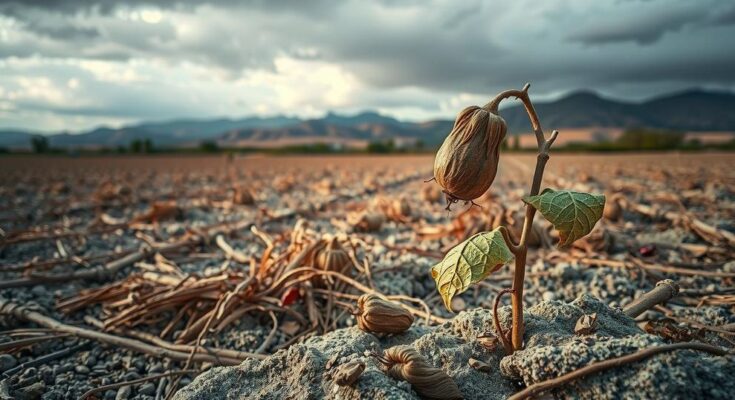Residents of Goma face acute hunger and fear following the M23 rebel group’s recent takeover. The conflict has disrupted essential supplies, leaving many without food or basic services. Historical tensions and accusations of human rights abuses complicate the situation as residents navigate daily challenges amidst renewed violence. Some locals, however, view M23’s presence as potentially stabilizing while expressing distrust toward the Congolese government.
Residents in Goma, located along the eastern border of the Democratic Republic of the Congo (DRC) with Rwanda, are grappling with extreme hunger and palpable fear following the recent takeover by the M23 rebel group. Judith Saima, a local merchant, expressed the hopelessness felt by many, stating, “We are very afraid. This situation feels hopeless.” The volatile situation led to significant violence and disorder, leaving many trapped and reliant on dwindling resources.
Due to the conflict, access to basic necessities, particularly food, has become severely hindered as key trade routes were shut down. Ngise Ngeleka, a student, noted the stark reality when a neighbor was left deceased in the street from gunfire. Adeline Tuma also highlighted the dire conditions, lamenting, “We have nothing left to eat. My children cry from hunger. I make porridge without sugar. My shop has been looted. I curse this war. A new, grim chapter of our lives begins.”
Travel by boat, a crucial supply route, has been effectively halted since M23 occupied the nearby port town of Minova. A small border crossing to Gisenyi in Rwanda has also been blocked. Residents lost access to essential services like water and electricity, only recently experiencing a brief return of power. Many are filling jerrycans with water from Lake Kivu until normal services resume.
The M23 group has preceded several ethnic Tutsi-led insurgent factions in this mineral-rich region, exacerbating longstanding tensions. Rwanda supports M23 ostensibly to eliminate fighters tied to the 1994 genocide, though critics argue Rwanda aims to exploit the region’s mineral wealth. Both the rebel group and the Congolese army have reportedly committed severe human rights violations amidst the recent skirmishes.
The resurgence of M23 recalls historical traumas for the people of Goma. A resident reflected on the stark differences from their previous takeover in 2012, recalling the lesser impact of former conflicts. “This time, the situation is far worse. We spent three days hiding under our beds, without food,” they asserted, emphasizing the dire state of affairs.
Hospitals are overwhelmed with casualties from the fighting, while humanitarian efforts remain paralyzed. Recent estimates report at least 45 deaths and over 2,000 injuries in Goma. Abandoned military uniforms have been appropriated by children amid rising lawlessness, illustrating the chaotic environment.
In a bid to maintain control, M23 declared its intention to govern Goma, with its leader urging residents to return to normalcy. Furthermore, plans to resume schooling for children and establish humanitarian aid corridors have been proposed. The stakes are high, reminiscent of the 1990s and 2000s when regional powers managed trade and governance in eastern DRC.
Not all residents oppose M23’s presence; some perceive an opportunity for stability. An anonymous senior UN official noted, “A lot of people are sick and tired of the chaos. If they can trade, security improves, their daily lives improve, then M23 could be popular.” Olakire Senga, a local doctor, echoed such sentiments regarding government failure, stating, “I think we need to assess the maturity of those arriving and join them. Personally, I went out to welcome them.”
The situation in Goma is a continuation of a long history of conflict in the eastern DRC, where multiple armed groups have vied for control over the strategically important region abundant in mineral resources. The M23 rebel group, supported by Rwanda and composed mostly of ethnic Tutsis, represents a significant military and political presence that has contributed to instability since its inception in the early 2000s. The humanitarian crisis exacerbated by the conflict has left communities struggling with access to food, healthcare, and safety, reminiscent of past conflicts that resulted in millions of deaths due to violence, starvation, and disease. The intricate dynamics between local politics, regional interventions, and the quest for control over resources complicate the prospects for peace and stability in this troubled area.
The capture of Goma by the M23 rebel group has plunged the city into chaos, where residents are confronted with hunger and fear as access to food and essential services diminishes. While some view the presence of M23 as a potential path to stability, widespread concerns over human rights abuses and the ongoing humanitarian crisis loom large. The complex interplay between local and regional politics underscores the delicate situation in eastern DRC, where the search for security and adequate resources remains ever elusive.
Original Source: www.theguardian.com




